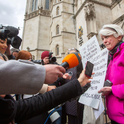There has been a great disturbance in the constitutional arrangements of the United Kingdom. Some may say there have recently been many such disturbances—or at least many disturbing things. But there is one which may be more significant than all the others. And that is the rise of the “will of the people”.
Of course, those in support of Brexit—surprised by their widely unexpected success in the 2016 referendum and knowing that the consensus at Westminster had long been in favour of EU membership—adopted the slogan as a means of forcing through the departure.
But since that departure, the phrase has been employed in other contexts. In May 2023, Alex Chalk, the lord chancellor, and Suella Braverman, the then home secretary, earnestly told the House of Lords not to defy the “will of the British people” by opposing the government’s Illegal Migration Bill.
And this year, the prime minister himself warned the House of Lords, in respect of the Rwanda deportation bill, that it was the “will of the people” that the legislation be passed. That a prime minister who had not won a general election—and indeed had not even won his own party’s membership contest—could freely use that rhetorical device in support of a policy that had not even featured in his party’s manifesto shows how far the “will of the people” has travelled. This totem of the Brexit era has outlived Brexit—and continues to warp our constitutional settlement today.
Senior ministers seem seriously to be advancing the view that certain laws and policies cannot be properly scrutinised by the legislature because it would frustrate the supposed “will of the people”. When this was used during Brexit, when a narrow but clear majority of those voting in a dedicated referendum supported departure of the UK from the EU, there was some force in the point—notwithstanding the fact that the referendum result was not legally binding.
But now ministers—very senior ministers—use the slogan to push through legislation not connected with Brexit, and not connected with any democratic process. The “will of the people” is now whatever they say it is, and, once they say it, senior ministers expect the government to get its way. This is not a welcome development.
Previously, in less exciting constitutional times, it was the concept of a general election mandate that ministers could deploy against unwanted legislative opposition. If a policy had been set out in a victorious party’s manifesto at a general election, then the government would insist on getting its way against Lords opposition.
But even these mandates often had weak constitutional and political purchase. Some policies set out in manifestos never got any further. Some promises kept being carried over to future manifestos, becoming totems or aspirations rather than achievable policies. And some manifesto promises have been reneged upon.
The Conservative government elected in 1987 did not persist with the controversial “community charge” (better known as the poll tax), even though the proposal was spelled out in its manifesto. Nobody suggested the poll tax should stay in place because it was the will of the 1987 electorate.
The reason general election mandates have historically had such weak effects is that in a parliamentary democracy, members of parliament are representatives and not delegates.
The hallowed words of the 18th-century politician Edmund Burke to his own electors were often quoted:
“Your representative owes you, not his industry only, but his judgment; and he betrays, instead of serving you, if he sacrifices it to your opinion… Parliament is not a congress of ambassadors from different and hostile interests, which interests each must maintain, as an agent and advocate, against other agents and advocates; but parliament is a deliberative assembly of one nation, with one interest, that of the whole; where, not local purposes, not local prejudices ought to guide, but the general good, resulting from the general reason of the whole. You choose a member indeed; but when you have chosen him, he is not member of Bristol, but he is a member of parliament.”
Burke is often credited as being a founder of modern conservatism. Indeed, the Conservative party was established in the 1830s by politicians unhappy with the notion of mass politics, which they associated with the mob and the revolutions in France.
The then party leader Robert Peel set out the general principles that his party would follow in government in what became known as the Tamworth Manifesto. He avoided being too precise:
“It is unnecessary for my purpose to enter into any further details. I have said enough, with respect to general principles and their practical application to public measures, to indicate the spirit in which the King’s Government is prepared to act.”
Both Burke and Peel would be aghast at politicians invoking the “will of the people”. Indeed, such a turn would be a fundamental contradiction of their views of the constitution. The Conservative party appears to have moved so far from its origins that it now stands in opposition to what it once championed.
The Burkean model, however, endured until recent times. And then came referendums after 1973. They were used by in turn by prime ministers Edward Heath, Harold Wilson and James Callaghan to deal with knotty political issues with Northern Ireland, membership of the (then) European Communities, and Scottish and Welsh devolution, respectively.
Referendums were avoided by Margaret Thatcher and John Major, but were employed by Tony Blair for the Good Friday Agreement and Scottish and Welsh devolution. David Cameron’s first government also used a referendum on electoral reform as a sop to its Liberal Democrat coalition partners.
All these referendums were before the Brexit poll: even without that consequential vote, governments were in the habit of taking certain matters out of the hands of parliament, and the Burkean concept of a representative parliament was already being undermined. On certain discrete questions, the “will of the people” would prevail: sometimes in constituent parts of the United Kingdom, but also across the UK as a whole. In this way, the doctrine was not introduced by Brexit, but was a continuation of what was already happening in British politics.
And this was not a bad thing. The legitimacy of the Good Friday Agreement, and of the current devolution settlements, is established in a way that would never have been the case had those decisions just been made in Westminster. On particular questions, the Burkean model had to yield, and rightly so.
But on questions which affect the United Kingdom as a whole, the problem with referendums is that they can set up a mandate which competes with, and contrasts with, the deliberations of a parliamentary system. With Brexit, the referendum mandate ensured that the views of MPs (a majority of whom were in favour of membership) had to be set aside. And so heady did things get that even judges upholding the rights of parliament against the executive were accused of being “enemies of the people”.
Now, in this post-Brexit period, ministers have got into the habit of using this powerful “will of the people” device, even when there is not a referendum result—or even a manifesto commitment—which can be prayed in aid. No opposition is allowed; the ministers must get their way.
The development of the UK political system over the last two centuries was predicated on the weak notion of mandate. Electors voted for MPs, and legislation passed by the House of Commons was scrutinised by the House of Lords, and the elected chamber could ultimately get its way if it really wanted.
Some may contend that there should be more referendums, on other issues than European Union membership—though the taste for such polls seems to have declined since 2016. But if there are to be more referendums then serious consideration needs to be given to how such direct mandates fit in with a system geared to representative democracy.
And if we are now stuck with the rhetoric of the “will of the people”—with all its emotive power—then consideration also needs to be given to how such political forcefulness can be checked and balanced. When can ministers use this device, if ever? For with this notion, a highly disruptive—indeed destructive—political genie has been released from its constitutional bottle; the will of the people is now a will-o’-the-wisp.













